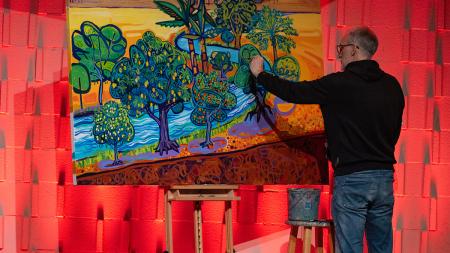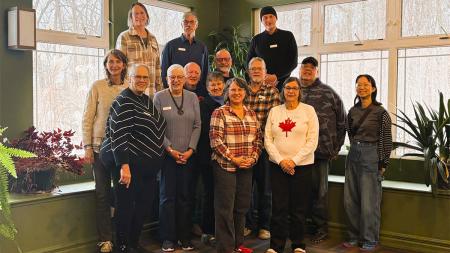Faithfully Fact-Checking the Candidates

Ryan Struyk (seated in the middle) is covering the 2016 election for ABC News in Washington.
Calvin College
Calvin College graduate, Ryan Struyk, was part of the ABC News team of journalists who worked Monday night to fact-check statements made by the U.S. presidential candidates during their first debate.
Throughout the 90-minute nationally televised debate and afterward, Struyk kept busy helping to fact-check and provide analysis of the statements made by Republican candidate Donald Trump and Democratic candidate Hillary Clinton.
In doing so, the 2014 graduate says he was acting out an important aspect of his Reformed faith.
“As Christians, we are called to pursue the truth—and journalism in essence is about pursuing the truth,” said Struyk. “Our job as journalists is to hold politicians and institutions accountable and enable citizens to seek and make justice a reality in our society.”
On September 23, Struyk joined John Muyskens, a 2015 Calvin graduate and recipient of the Pulitzer Prize for national reporting, to offer a presentation titled “Faithful Fact-Checking” as part of the college’s “Challenges for the Next President Series,” They spoke in the Bytwerk Theater to a crowd of about 200 people.
“I have lived and breathed Donald Trump and Hillary Clinton for the last 14 months,” said Struyk, who focuses on such areas as polling, campaign finance, and fact-checking as part of ABC’s 2016 election team.
“One of our goals on our team is to combat some of the false claims made by the candidates. We want to make sure what they are saying is clear. We try to come back with reliable, accurate data.”
Fact-checking is a phenomenon that has taken hold across the media over the past decade or so, said Muyskens, a graphics editor for the Washington Post.
“This is a movement that came about after the Iraq War when it was found that contentions that Iraq had weapons of mass destruction were not true,” he said.
Muyskens is part of the team that won the Pulitzer Prize for an interactive website addressing the number of police shootings that have taken place in the United States. He is now helping to chart the statements made by the U.S. presidential candidates as the Nov. 8 election approaches.
“At the Washington Post we deal with different shades of the truth by giving statements different Pinocchio ratings,” said Muyskens.
Named after the fictional character whose nose grows every time he lies, the Pinocchio ratings run from a 1, for a statement with elements of untruth, to a 4, for what the newspaper considers a “whopper,” said Muyskens.
The newspaper also awards Geppetto checkmarks for dubious statements that turn out to be true. (In the Pinocchio tale, Gepetto is Pinocchio’s woodcarver/father.)
In its most recent 2016 Election Fact Checker feature, the Post gave Trump an average of 3.4 Pinocchios for a total of 75 questionable statements, and Clinton received an average of 2.2 Pinocchios for 44 such statements.
“Most of the political campaigns are equipped to respond to fact-checking quickly,” said Muyskens. “But the Trump campaign doesn’t respond to fact-checking.”
Struyk said this election cycle is unusual, especially with needing to address what is true and untrue.
Many news organizations, for instance, have used strong language—and have done so regularly—in calling into question some of Trump’s statements, such as his remarks about his role in promoting the unfounded rumor that President Obama is not a U.S. citizen, Struyk said.
Similarly, the media have frequently referred to Clinton as untrustworthy in relation to her statements as to why she used a private email server when she was Secretary of State.
“This campaign is rewriting the rules of what news organizations would normally do,” said Muyskens.
At both ABC News and the Washington Post, they turn to the websites FactCheck.org and Politifact.com, along with a range of experts and other resources to check facts, said Struyk.
“Fact-checking involves a lot of research and calling up lots of experts,” he said. “Fact-checkers find independent confirmation outside of themselves.”
Covering the 2016 campaign, said both of the presenters, is difficult for journalists because they are doing their job at a time when a recent Gallup Poll has found that Americans' confidence in the mass media has plummeted to an all-time low in 2016.
“We are doing our job in a culture of dissatisfaction,” said Struyk. “The survey found that two-thirds of voters in this country don’t trust the media.”
In addition, both Struyk and Muyskens said they are working in an atmosphere in which many people get their news through social media, which targets them with stories that carry a certain point of view.
“That means the stuff you get mainly addresses your political bent,” and this creates an “echo chamber” effect in which you hear only what you want to hear, said Struyk.
As for fact-checking, “it is a messy business” in this era of claims and counterclaims on so many topics “when every word matters,” said Struyk.
The Challenges for the Next President Series, which will cover foreign policy (Oct. 13) and the economy (Nov. 3) yet this fall, is sponsored by the Calvin College Faith and Citizenship Initiative and the Henry Institute.
Topics covered this past spring included the environment, immigration, religious freedom, and criminal justice reform.


